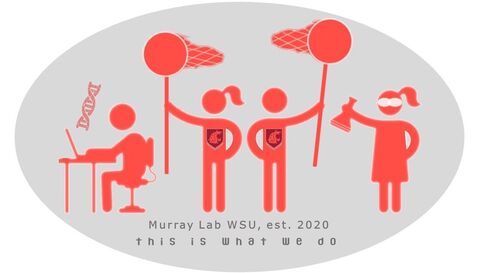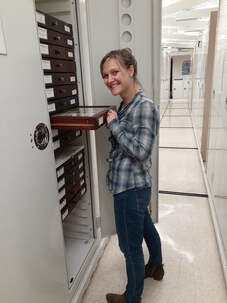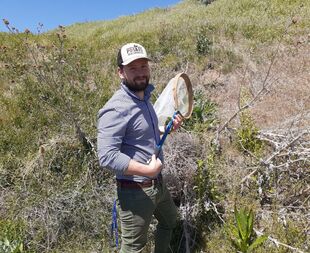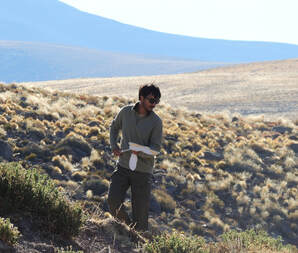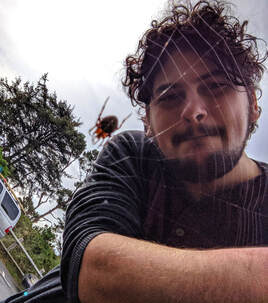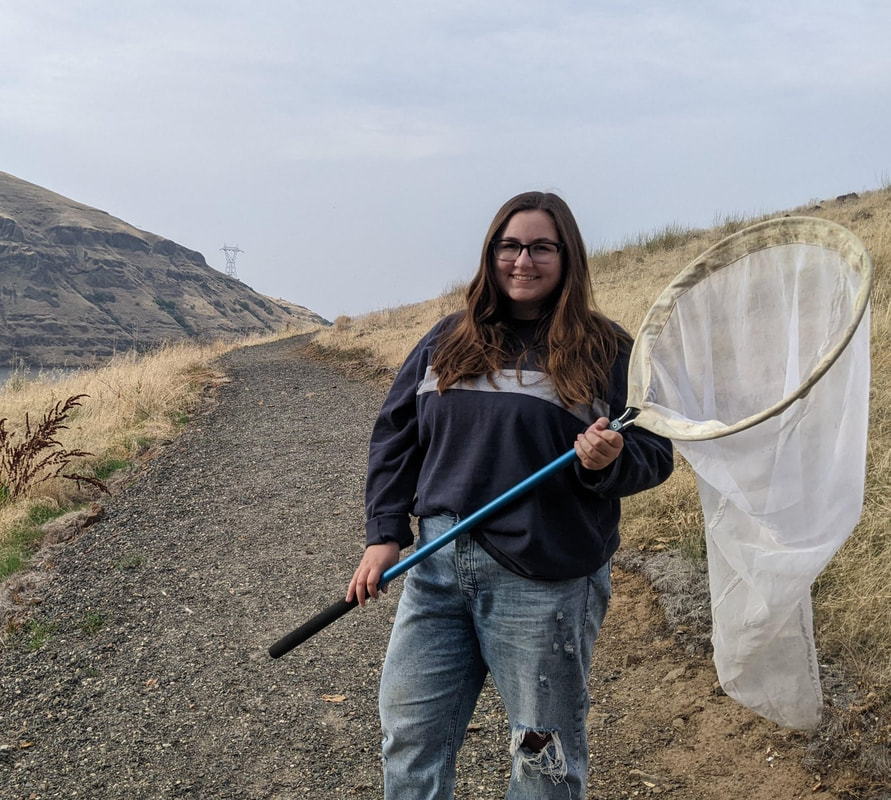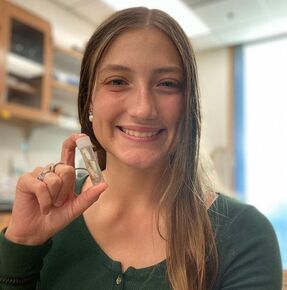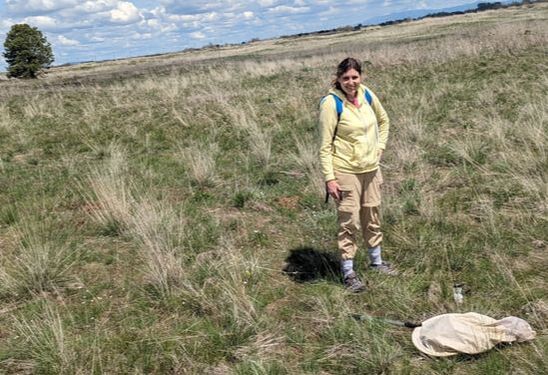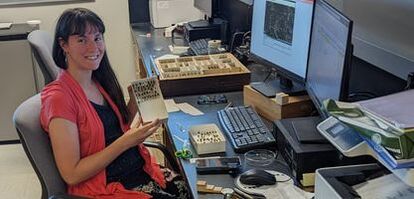Work in the Murray and Bossert lab currently centers around bees and wasps within the Aculeata (the stinging Hymenoptera, which includes ants, bees, and wasps). Many higher-level relationships among aculeates are still uncertain. We work with phylogenies and other phylogenetic comparative methods in order to study patterns of evolution. Our expertise includes phylogenomics, taxonomy, museum curation, molecular dating, diversification, historical biogeography, and comparative analyses. The lab is in the exciting stage of being newly established and building personnel and resources, and we welcome candidates who will contribute to a diverse laboratory environment.
We're looking for WSU students to help us digitize our pollinator specimens in the MT James Entomological Collection. You'll database label data and image pinned bees. Please contact [email protected] if you're interested in learning more.
people
Dr. Elizabeth MurrayTelford Family Professor & Director of the MT James Entomological Collection
My work is based on the adage that 'Nothing in evolution makes sense except in the light of phylogeny'. Phylogenetic relationships provide our lab a framework for investigating a variety of evolutionary questions. email: [email protected]
postdocs and education:
Postdoctoral Fellow at the National Museum of Natural History, Smithsonian Institution Department of Entomology (Wash., D.C.); Postdoctoral Researcher and Lecturer at Cornell University Department of Entomology (Ithaca, NY). PhD in Entomology, University of California, Riverside; MS in Entomology, Kansas State University; BS in Biology, Gustavus Adolphus College, MN. I have info on previous work & my teaching on my personal website. |
Dr. Silas BossertAssistant Professor
Formerly an assistant research professor since 2020, now he is a tenure track professor and lab PI/advisor. Congrats, Silas! For personal website, click here. I am an evolutionary biologist specialized in the biology of bees. Before I became a member of the Murray Lab, I was a predoctoral fellow at the Smithsonian National Museum of Natural History in the lab of Seán Brady. My research uses four main angles to study bee evolution and natural history. (1) I use phylogenies to study relationships among bees and wasps. This includes methodological studies on bioinformatics of phylogenomics. (2) Using the ‘phylogenetic lens’, I study traits and behavior, patterns and pollen use. (3) I am interested how genes contribute to these traits. (4) I describe previously unknown bees! In times of global insect decline, describing new species to science is more important than ever. email: [email protected] |
Dr. Felipe FreitasPostdoctoral Researcher and lab member since summer 2022.
Felipe is an evolutionary biologist with experience researching phylogenetics, phylogenomics, biogeography, and bee diversity. He has a bachelor's degree in Biological Sciences from Faculdade Pitágoras, a master's degree in Zoology by Universidade Federal de Minas Gerais (UFMG) and a doctorate degree in Entomology by Universidade de São Paulo (USP), all in Brazil. His main interests in science are complex problems in phylogenetic research, historical biogeography, and bees in general. His main interests outside of science are soccer and music (only listening 😊). email: [email protected] |
Nate Green, PhD studentMy interest in Entomology was spurred in 2015, when I took a Spider Biology course and became infatuated with arthropods. Soon after I took a General Entomology class where I discovered my love for Hymenoptera. I continued collecting spiders and insects after the courses and kept teaching myself. After working in biomedical research for a few years, I decided to return to school studying insects. I started here at WSU in the Spring 2021, where I'm working on the systematics of Pseudomasaris and Euparagia (Hymenoptera: Vespidae).
Educational background: B.S. in Biology with a minor in Chemistry from The University of Akron email: [email protected] |
Hannah Cook, PhD studentI am a PhD student interested in phylogenomics, host-plant associations, biogeography, and bee diversity. I received my B.S. from the University of Rochester in 2021 where I previously studied climate adaptation and parasitic manipulation in social wasps. Around this time I was also involved in helping to digitize collection specimens, through which I gained an appreciation for bee diversity and taxonomy. Since joining WSU in the fall of 2022, I plan to study the systematics of rophitine bees and the evolution of their host-plant associations.
email: [email protected] |
Tatiana Bush, PhD studentI am from southern California where I completed my BS in entomology and plant biology and MS in entomology at UC Riverside focused on heteropteran systematics. My love of insects started at a young age; however, my interest in Hymenoptera did not start until working with parasitic Hymenoptera in undergraduate studies. For my PhD, I am interested in host plants, divergence dating, and ancestral characters through time and how diversification is driven.
email: [email protected] |
Lexi Menth, MS studentLexi started at WSU this summer 2023 and is doing field work at Fairchild Air Force Base, which is near Spokane, WA. We are collaborating with the US Fish and Wildlife Service to do a survey of the insects of the Base. Lexi is co-advised by Elizabeth Murray and Richard Zack.
email: [email protected] |
Current Undergraduate Workers
Lab Alumni
Bergen Till, spring 2022 - May 2023, WSU undergraduate museum bee digitizer. Currently working for the Peace Corps.
Jack Williams, spring and summer 2022, WSU undergraduate museum digitizer; currently at UF
Mariah Combs, summer 2022. WSU B.S. 2021. Collected potato aphids for USDA-ARS Potato Project
Jeremiah Wheeler, summer 2022, UI undergraduate museum digitizer
Marquea Cole, spring 2022, WSU undergraduate museum digitizer
Jenny Gan, 2020-2021, MS student, currently with USDA-ARS in Logan, UT.
Jack Williams, spring and summer 2022, WSU undergraduate museum digitizer; currently at UF
Mariah Combs, summer 2022. WSU B.S. 2021. Collected potato aphids for USDA-ARS Potato Project
Jeremiah Wheeler, summer 2022, UI undergraduate museum digitizer
Marquea Cole, spring 2022, WSU undergraduate museum digitizer
Jenny Gan, 2020-2021, MS student, currently with USDA-ARS in Logan, UT.
|
|
the insect collection at WSU
|
Visit the museum website HERE.
Lab members utilize museum collections regularly for their research projects. The Department of Entomology is proud to host the MT James Entomological Collection, which holds several million specimens. We are especially strong in historical material from the state of Washington. |
